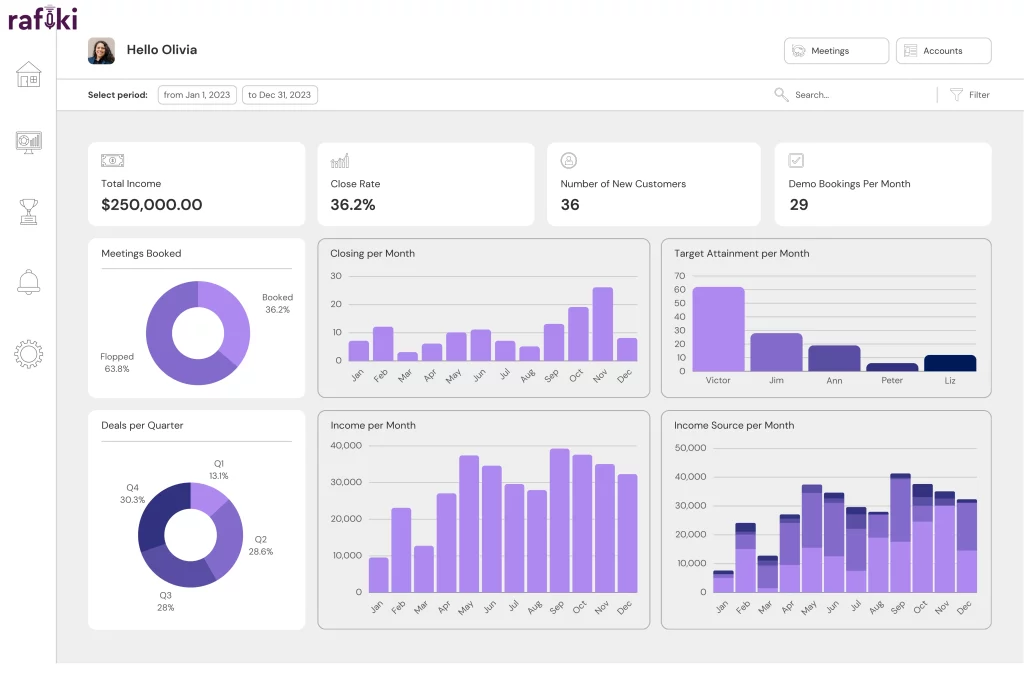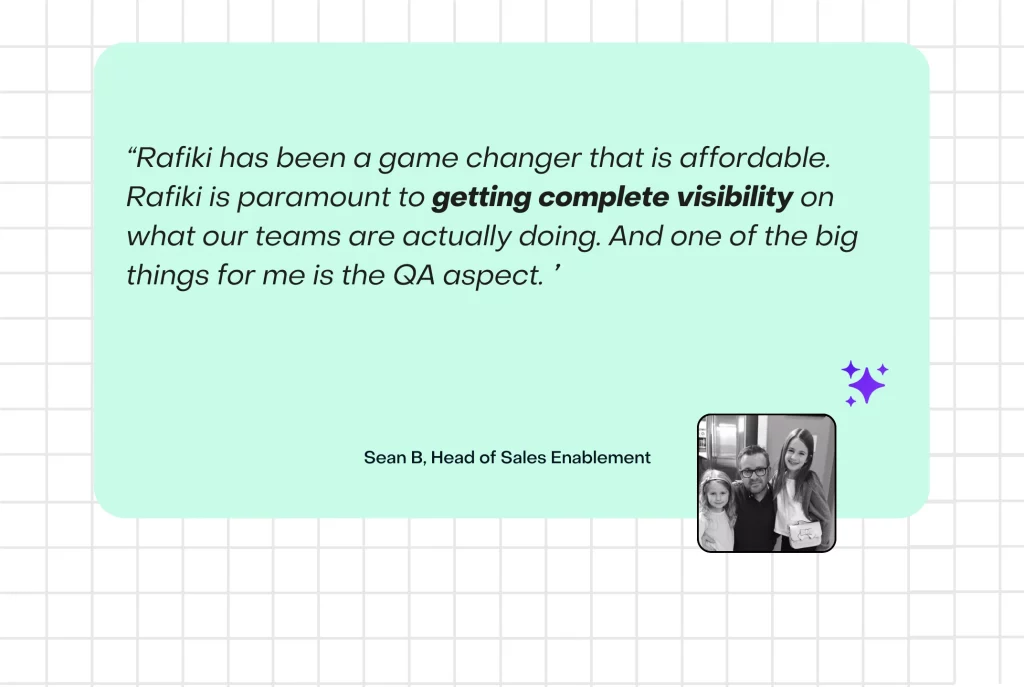Why Rafiki
Pricing


Pricing
Solutions

RevOps Leaders
Synchronize revenue generating functions

SDR Leaders
Get your team aligned and Coach your Reps 3x faster at scale

Sales Leaders
Unlock pipeline truth, drive confident forecasts

Sales coaching has emerged as a pivotal element in the competitive tapestry of today's business environment, transcending beyond mere training to become a critical driver of sales force effectiveness, individual performance, and overall organizational success. In an era marked by rapid market changes, technological advancements, and heightened customer expectations, data driven sales coaching equips sales professionals with the adaptive skills, strategic insights, and resilience needed to thrive. It fosters a culture of continuous learning, improvement, and agility, enabling sales teams to navigate complexities, seize opportunities, and sustain growth.
This article is dedicated to unraveling the intricacies of leading sales coaching models that have shaped the success stories of countless sales teams across industries. By exploring and comparing these models, we aim to provide a panoramic view of the varied approaches to sales coaching, each with its unique principles, techniques, and outcomes. Our objective is to offer a roadmap that guides sales leaders, coaches, and professionals in selecting and tailoring the most effective coaching strategies to their team's needs, driving unparalleled performance and achieving competitive superiority in the marketplace.
Sales coaching is all about helping salespeople get better at what they do. It's a one-on-one approach that's tailored to each person, making sure they have the skills and confidence they need. This isn't just a one-time training session; it's an ongoing process that adapts to each sales rep's needs.
Why is sales coaching so important?
It's simple: it helps the sales team do better, which means the business does better, too.
Coaches work with sales reps to sharpen their selling skills, tackle challenges, and build strong relationships with customers. This leads to more sales and happier customers.
On a personal level, sales coaching is a game-changer for sales reps. It's like having a personal trainer for your sales skills. Coaches help identify what each rep is good at and where they can improve. They set goals, offer feedback, and cheer on their progress. This not only boosts sales numbers but also boosts confidence.
For the whole sales team, coaching builds a strong, united group. It encourages everyone to share tips and support each other, creating a positive and motivated team atmosphere. This team spirit means everyone works better together, leading to even more success.
In short, sales coaching is key for a winning sales team. It's about giving personalized support to each sales rep, helping the entire team work better together, and driving the business forward. It's the secret sauce for a high-achieving sales force ready to take on the market's challenges.
In the realm of sales, various coaching models offer unique frameworks and methodologies designed to elevate the performance and effectiveness of sales teams. Each model brings its own set of principles and practices, catering to different coaching needs and styles. Here’s a detailed look at some of the leading sales coaching models:
G: Goal - The coaching process begins by setting clear, achievable objectives.
R: Reality - This involves assessing the current situation and identifying challenges.
O: Options - The coach and sales rep explore different strategies to overcome obstacles.
W: Will/Way Forward - Finally, they commit to specific actions to achieve the set goals.
The GROW Model is praised for its simplicity and flexibility, making it applicable to a wide range of sales scenarios. It encourages a solution-focused approach, empowering sales reps to take ownership of their goals and the paths to achieve them.
O: Outcome - Defining the desired results or outcomes of the coaching.
S: Scaling - Measuring current progress and potential improvements.
K: Know-How - Identifying the skills and knowledge needed to reach the outcome.
A: Affirm & Action - Recognizing strengths and setting actionable steps.
R: Review - Evaluating progress and adjusting the plan as necessary.
The OSKAR Model emphasizes a strengths-based approach, focusing on leveraging existing abilities and successes to drive improvement and achieve desired outcomes.
C: Contracting - Establishing the coaching relationship and setting expectations.
L: Listening - The coach actively listens to understand the sales rep’s perspective.
E: Exploring - Together, they explore challenges and potential solutions.
A: Action - Developing a plan with concrete steps towards the goals.
R: Review - Reflecting on the actions taken and their outcomes, leading to continuous improvement.
The CLEAR Model is valued for promoting open communication and collaboration, fostering a supportive coaching environment that encourages self-reflection and proactive problem-solving.
F: Focus - Clarifying the focus of the coaching session.
A: Accountability - Establishing responsibility for actions and outcomes.
S: Systems - Utilizing systems and tools to support and track progress.
T: Transformation - Fostering personal and professional growth.
E: Engagement - Maintaining active involvement and commitment.
R: Results - Focusing on achieving tangible outcomes.
The FASTER Model is designed to accelerate performance improvement, with a strong emphasis on accountability, engagement, and achieving measurable results.
This model adapts the coaching style based on the development level of the sales rep, ranging from directing and coaching to supporting and delegating. It recognizes that the most effective coaching approach depends on the individual’s competence and motivation, making it a highly personalized coaching strategy.
This model is built around three core behaviors:
It encourages sales reps to challenge clients' thinking, tailor communications to each stakeholder, and take control of the sales process. In coaching, this model focuses on developing these behaviors to navigate complex sales environments successfully.
The ValueSelling Framework® centers on engaging with prospects and customers by focusing on their business needs and delivering tangible value.
Coaching within this framework involves equipping sales reps with the skills to identify and articulate the unique value their solutions offer to each customer.
This model revolves around four types of questions:
- designed to uncover and develop customer needs. Coaching in the SPIN Selling framework focuses on enhancing reps' questioning skills, enabling them to lead more effective and consultative sales conversations.
Each of these sales coaching models offers distinct pathways to enhancing sales performance, tailored to different coaching needs, sales rep development stages, and sales environments. Understanding and applying the right model or combination of models can significantly impact a sales team’s success, fostering an environment of continuous growth, learning, and achievement.
When delving into the array of sales coaching models, it becomes evident that each brings its unique strengths and potential limitations to the table. Understanding these nuances is crucial for selecting a model that aligns with your team's specific needs, sales processes, and organizational culture.
| Models | Pros | Cons |
|---|---|---|
| GROW | Simple and structured Clear goal-setting process Versatile and widely applicable | May oversimplify complex issues Lacks focus on personal development |
| OSKAR | Strengths-based, positive approach Encourages leveraging existing capabilities Focuses on desired outcomes | May overlook addressing weaknesses Less structured, which can be challenging for some coaches |
| CLEAR | Promotes open communication and collaboration Encourages self-reflection and exploration Flexible and adaptable to individual needs | Less directive, which might not suit all situations Requires experienced coaches to navigate effectively |
| FASTER | Emphasizes quick action and accountability Goal-oriented with a focus on results Encourages engagement and commitment | May prioritize short-term results over long-term development High intensity might not suit all learning styles |
| Situational Leadership® | Highly personalized to the coachee's development level Flexible in coaching approach Adapts to the evolving needs of sales reps | Requires high skill level from coaches Can be complex to implement consistently across a team |
| The Challenger Sale Model | Encourages a proactive, insightful approach to sales Enhances critical thinking and innovation Effective in complex sales environments | May be challenging to adopt in transactional sales Requires a cultural shift for full effectiveness |
| ValueSelling Framework® | Aligns with consultative selling practices Focuses on delivering customer value Enhances customer relationships | Specialized nature limits broader applicability Requires in-depth understanding of customer needs |
| SPIN Selling | Enhances discovery and needs analysis Improves questioning skills and sales conversations Based on extensive research and practice | Focuses mainly on the questioning aspect May need supplementation with other coaching for a holistic approach |
Choosing the appropriate sales coaching model(s) involves a careful assessment of your team's specific dynamics, the complexity of your sales processes, and the prevailing organizational culture.
Consider the following guidelines:
Successful implementation of a sales coaching model requires more than just understanding its framework; it demands a commitment to embedding the model into daily practices and ensuring ongoing support and resources are available.
Here are some steps to consider:
Selecting and implementing the right sales coaching model(s) can dramatically enhance your sales team's effectiveness, adaptability, and overall performance.
By carefully considering your team's unique needs and thoughtfully integrating coaching into your sales culture, you can unlock the full potential of your sales force.
At the core of every successful coaching model lies a crucial element: data.
The effectiveness of various models might vary, but their success invariably hinges on the availability and quality of data. Whether it's tracking the ratio of closed to lost deals, monitoring email engagement, or analyzing call durations, data is indispensable for evaluating activities, setting objectives, offering feedback, and monitoring outcomes and progress.
This necessity, however, introduces a new challenge for organizations. The task of sifting through extensive datasets to create dashboards, perform analyses, and generate reports typically requires a dedicated team of data analysts.
This is precisely where Rafiki steps in, offering actionable insights with ease. Our commitment to delivering meaningful insights is not just a promise; it's a reality backed by our technology. We analyze your sales team's call recordings discreetly to provide actionable insights, enabling you to make informed decisions.

Rafiki's AI-driven sales analytics platform is designed for efficiency and ease of use, supporting both traditional and remote sales coaching by leveraging your historical sales data as a foundation. This data serves as a reference point to monitor activities, establish goals, and assess your sales team's performance.

Our system not only aids sales representatives in refining their sales tactics but also provides detailed metrics such as call duration, moments of hesitation, and talk-to-listen ratios, facilitating a deeper understanding of your team's current standing and potential improvements.
By integrating Rafiki's intelligent insights into your sales coaching practices, you unlock the potential for data-driven coaching, significantly enhancing your team's conversion rates and overall success.